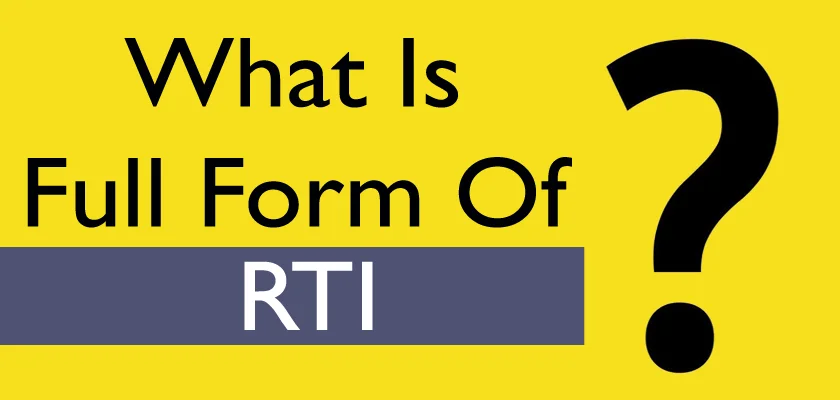Do you know what is the RTI Full Form? The full form of RTI Act is the Right to Information. The Right to Information (RTI) Act of 2005 was an important moment for Indian democracy because it gave the people the legal means to demand government openness and accountability. Accountability and openness are cornerstones of a functional democracy. Everyone has a right to know how their tax money is being spent by the government.
Table of Contents
What is the RTI Full Form?
RTI Full Form – Right to Information
What is RTI?
RTI stands for Right to Information. It is a law that gives citizens of India the right to access information held by public authorities. The law was enacted to promote transparency and accountability in governance. Under the RTI Act, citizens can demand information from any public authority, including government departments, public sector undertakings, autonomous bodies, and NGOs that receive government funding.
History of the RTI Act
The RTI Act was passed by the Indian parliament on 12 October 2005 and came into force in the same year. The act has since been instrumental in promoting transparency and accountability in governance.
How RTI Act Works?
Under the RTI Act, citizens can file an application with a public authority requesting information. The public authority is required to respond to the application within 30 days and provide the information requested. If the information is not provided, or if the citizen is not satisfied with the response, they can file an appeal with higher authorities, including the Information Commission.

How to File an RTI Application?
Step-by-Step Procedure to File an RTI Application:
- The RTI application form is available on the Central Information Commission’s (CIC) website.
- Mention the name and address of the public authority you are seeking information from.
- Clearly state the information you are seeking and the reasons for seeking it in a concise and specific manner.
- Provide your name and contact details, including phone number and email address.
- Pay the fee, if applicable, through cash, demand draft or online payment.
- Submit the application at the designated public authority office, either in person or by post.
- Once the application is received, the public authority has to respond within 30 days. In case of delay, a penalty can be imposed on the public authority.
Uses of the RTI Act
The Right to Information (RTI) offers individuals a wide array of applications, making it a powerful tool for transparency and accountability. Here are some of the key uses of RTI:
- To request information in a particular form.
- To gather information about the public authority’s performance.
- To access records held by the public authority.
- To acquire information about the procedures followed by the public authority in making a particular decision.
- To seek a review of the decision of the public authority in relation to your request for information.
- To obtain information about the policies and guidelines of the public authority.
- To complain if you are not satisfied with the response to your request for information.
- To obtain information about the reasons for a particular decision made by the public authority.
FAQs- What Is The RTI Full Form?
Q1. What is the RTI Full Form?
Ans. RTI stands for Right to Information.
Q2. What is the purpose of the RTI Act?
Ans. The purpose of the RTI Act is to promote transparency and accountability in governance by granting citizens the right to access information held by public authorities.
Q3. When was the RTI Act enacted?
Ans. The RTI Act was passed by the Indian parliament on 12 October 2005.
Q4. How does the RTI Act work?
Ans. Under the RTI Act, citizens can file an application with a public authority to request information. The public authority must respond within 30 days and provide the requested information.
Q5. Who can file an RTI application?
Ans. Any citizen of India can file an RTI application.
Q6. Can organizations or NGOs file RTI applications?
Ans. No, RTI applications can only be filed by individual citizens. Organizations and NGOs cannot file RTI applications.
Thanks for reading What is the RTI Full Form? Bookmark our website Whatisfullform.com to know or read our collection of full forms.


